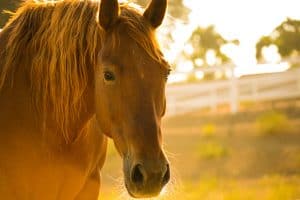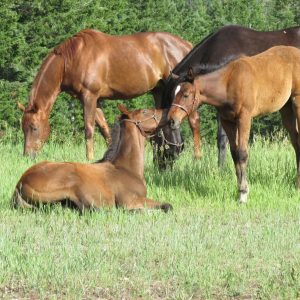Many horse owners believe that meeting the daily nutrient requirements for their horses with a good quality hay, a complete feed, and a mineral block is enough to keep them healthy…until one day they’re not. They may start to show signs of fatigue, a dull hair coat, cracking hooves, perhaps they start to cough a bit, or their breathing becomes laboured. Or maybe they start to experience muscle spasms or having colic episodes.
Typically, the reasonable horse owner will say “Ya, but he’s on the best high-quality feed I can find, I supplement, I do the research, I have regular vet checks, I worm regularly…he’s been so healthy until now, I don’t know how this happened!”
Despite the efforts put forth by horse owners, barn managers, equine nutritionists and feed companies to keep our horses’ diets balanced for optimal health, one of the single biggest factors that lead to dis-ease in horses is nutrient deficiencies.
What are Nutrients?
A nutrient is defined as any life sustaining substance that is required for normal physiological function. This includes macro-nutrients such as protein, fats and carbohydrates, but it also includes micro-nutrients such as vitamins, minerals and essential fatty acids; all of which can be found in the food our horses eat.
 What the Research Says about Nutrient Requirements
What the Research Says about Nutrient Requirements
Now, if we don’t assume that our horses are getting all their vitamins and minerals they need from their hay and forage (which should never be assumed in a domestic environment), then what nutrients do they require and what is the daily minimum dosage they need before they start to show signs of deficiency or they develop a health condition?
The National Research Council (NRC) attempted to answer these questions in 2007 in the 6th edition of “Nutrient Requirements of Horses.”
This document references several studies dating as far back as 1940. In fact, some of the findings from 80 years ago are still being applied today. Even with all the clinical testing and research that has been conducted over the years, their recommendations for specific horse nutrients are still estimates at best.
The task of determining what horses need and the impact that specific deficiencies and excesses have on their massive amount of bone, muscle and tissue is very difficult, even using traditional methods. One of the biggest challenges that clinical studies face is finding an accurate method of testing that is reliable, reproducible and conclusive.
Nevertheless, the two most common traditional methods that are used to assess nutrient requirements in horses are blood samples and mineral absorption tests, both of which have significant limitations.
Traditional Methods of Assessing Nutrition in Horses
Let’s first look at blood testing which is a method often used to assess nutrition including vitamins and mineral levels. Even though the blood can sometimes detect irregularities of certain nutrients, this is not an accurate indicator of the nutrients inside the tissues and organs.
It has also been demonstrated that during long periods of induced deficiency, horses will develop a resilience or adaptation to that deficiency. In other words, the body gets accustomed to functioning with less nutrition than it needs. Even though no obvious signs or symptoms are evident, it is virtually impossible to assess what is happening inside the tissues and organs. After all, many of these nutrients play a vital role in supporting the thousands of bodily processes required for normal body function.
Another significant limitation of blood testing is that the blood will often maintain constant levels of nutrients regardless of any existing deficiencies. Why? Because when nutrients become depleted in the body, the blood will take these nutrients from other tissues or organs first, so that it can supply other areas of the body that need it. Therefore, it is very common for blood tests to come back normal even in the presence of deficiencies.
The second method of testing that is most commonly used to evaluate mineral requirements is absorption (also referred to as balance studies). This test is performed by feeding different amounts of a mineral to a horse and then measuring the amount that the horse eliminates in their urine and feces. By subtracting the difference, they can estimate the amount of mineral absorbed or digested. Besides being a very crude method, it also poses significant limitations.
> It can be very difficult to detect some of the micro minerals due to minute concentrations
> Like blood tests, digestibility is not a good indicator of tissue and organ requirements.
> The sources of error associated with this method are impossible to measure. For example, mineral losses can be attributed to other bodily processes (not just absorption), such as sweating.
Despite the lack of accurate information available, these out-dated estimates still serve as the basis for many of our horses feed programs today.
In fact, the Canadian Food Inspection Agency (CFIA) only make it mandatory to label minimum requirements for Vitamin A, D and E. Any other nutrients such as Thiamine (B1), Riboflavin (B2) and Pyridoxine (B6) are at the discretion of the feed manufacturer. The CFIA even states that “feeding vitamins other than [these] may not have a beneficial effect.”
This is simply not the case.
Even though it is important to have basic nutrient guidelines established to ensure our horses are getting the minimum amount of nutrition to stay alive, these minimum requirements are not enough to keep our horses in optimum health. This is made evident by the rising incidence of nutrient related diseases that are now seen in so many of our horses. In fact, some of them have reached epidemic proportions.
 In addition to nutritionally inadequate hay and feed, there are several other factors that prevent our domestic horses from receiving the amount of nutrition that they need including lack of exercise, over-medicating, performance demands, high stress levels, feed toxicity, illness, and an imbalance of sugar, protein, fats.
In addition to nutritionally inadequate hay and feed, there are several other factors that prevent our domestic horses from receiving the amount of nutrition that they need including lack of exercise, over-medicating, performance demands, high stress levels, feed toxicity, illness, and an imbalance of sugar, protein, fats.
The list goes on… And because the combination of all these factors vary from horse to horse, it is impractical to assume that every horse has the same nutritional requirements. Just because a feed program works for one horse does not mean it will work for all of them.
Since we can’t rely on traditional methods of nutrient testing to assess your horse’s nutritional status and we know that most equine nutrient requirements are not being met, and that nutrient deficiencies are one of the leading causes of horse health problems, how do we use nutrition effectively for both the prevention and treatment of common equine health conditions?
Therapeutic Nutrition for Horses
The key to ensuring that your horses have adequate levels of nutrition based on their individual needs is through understanding therapeutic nutrition. Having first-hand experience using single nutrients to resolve a variety of different horse health problems, I can tell you that nutritional therapy should be an essential part of every feed program. These conditions include but are not limited to colic, ulcers, skin conditions, respiratory problems, metabolic issues, stress, muscle and joint problems, hormone imbalances, fatigue, and even poor concentration.
Once you learn what each nutrient does, how to identify signs of deficiency, what conditions they are most beneficial for, and what form of each nutrient to supplement (they are not all created equal) you will be able to offer your horses a safe, natural, non-invasive and effective solutions that very few horse health practitioners know about.
By empowering yourself to take control of your horse’s health you will not only be saving yourself time, stress and unnecessary diagnostics but you will be investing in a long healthy life that you and your horse can both enjoy.
Interested in learning more?
My online training, Healing Horses Their Way, will not only teach you how to identify deficiencies but will also show you how to use over a dozen nutrients to resolve specific horse health conditions. Learn more here...
Meet Elisha
 I am an animal lover, health consultant, scientist and educator. I am passionate about delivering safe and effective health care to all animals but horses and dogs have a special place in my heart. I believe that through education and awareness of natural animal health we can drastically improve their quality of life and longevity. I invite you to join me on my quest to make the world a better place for all of them.
I am an animal lover, health consultant, scientist and educator. I am passionate about delivering safe and effective health care to all animals but horses and dogs have a special place in my heart. I believe that through education and awareness of natural animal health we can drastically improve their quality of life and longevity. I invite you to join me on my quest to make the world a better place for all of them.


